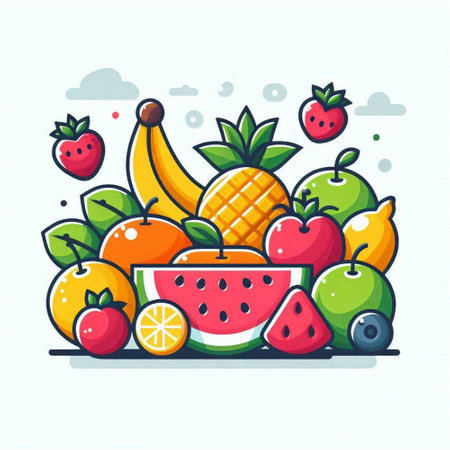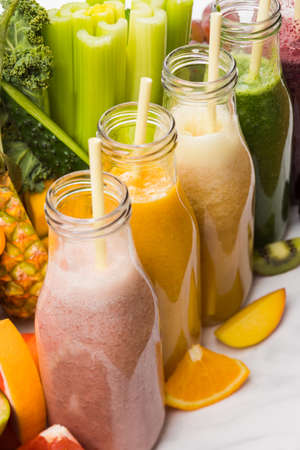Introduction: The British Boom in Juice and Smoothie Detoxes
Across the UK, juice and smoothie detoxes have swiftly become a cultural phenomenon. From London’s artisan cafés to local grocers in Manchester, vibrant bottles of cold-pressed blends line the shelves, promising everything from clearer skin to increased vitality. This surge is more than a fleeting fashion; it reflects deeper shifts in British attitudes towards health and well-being. Influenced by global wellness trends and a growing desire for natural solutions, many Britons are turning to liquid detox programmes as a means of hitting the “reset” button on their bodies. While these cleanses are often marketed as an antidote to modern stress and dietary excess, there remains considerable debate about whether the science truly supports their purported benefits. As we delve into the world of juice and smoothie detoxes, it’s important to examine both the motivations driving their popularity and the evidence behind their claims.
2. What Are Juice and Smoothie Detoxes?
Juice and smoothie detoxes, often referred to as “cleanses,” have become increasingly popular in the UK as a means to support wellbeing, aid weight loss, or kick-start healthier habits. These regimens typically involve consuming only blended fruits and vegetables—either as juices (where fibre is removed) or smoothies (where whole produce is blended)—for a set number of days, commonly ranging from 1 to 7.
Common Ingredients Found in British Supermarkets
Detox blends usually feature a mix of locally available produce. Here’s a table highlighting some typical ingredients you’ll find in juice and smoothie cleanses across Britain:
| Fruits | Vegetables | Additions |
|---|---|---|
| Apples, Bananas, Berries (strawberries, blueberries), Oranges, Pineapple | Carrots, Spinach, Kale, Celery, Beetroot, Cucumber | Ginger, Lemon juice, Mint, Chia seeds, Flaxseed |
Promises Made by Various Cleanses
The marketing around juice and smoothie detoxes in the UK often emphasises several key promises:
- Toxin Removal: Claims that consuming only juices or smoothies will help the body eliminate toxins accumulated from food or the environment.
- Weight Loss: Many cleanses advertise rapid weight loss as a primary benefit, suggesting participants can shed pounds quickly by restricting calories.
- Digestive Reset: Some believe that giving the digestive system a ‘rest’ from solid foods will improve gut health and boost energy levels.
- Glowing Skin and Improved Mood: Antioxidants and vitamins from fresh produce are touted to enhance skin clarity and elevate mood.
The next sections will explore whether these claims hold up under scientific scrutiny and how these practices fit into holistic wellbeing from both Western and traditional perspectives.

3. The Science: Do Detoxes Really Work?
When considering juice and smoothie detoxes, it is vital to examine the scientific research behind their claims. The body already possesses a sophisticated system for detoxification, primarily managed by the liver, kidneys, lungs, and skin. These organs work harmoniously to eliminate toxins and maintain internal balance—a concept not far removed from traditional Chinese medicine’s perspective on bodily harmony and qi flow.
Current scientific evidence suggests that there is limited support for the idea that short-term juice or smoothie cleanses significantly enhance these natural detoxification processes. Most reputable studies highlight that our bodies do not require extreme interventions like fasting or exclusive liquid diets to rid themselves of everyday toxins. Instead, maintaining a balanced diet rich in fruits, vegetables, and whole grains is far more effective for supporting long-term health and optimal organ function.
Furthermore, many of the purported benefits of juice detoxes—such as rapid weight loss or increased energy—are often temporary and may be attributed to calorie restriction rather than any enhanced elimination of harmful substances. In fact, some research indicates that restrictive cleanses can lead to nutrient deficiencies or disrupt normal metabolic activity if practiced for extended periods.
From a holistic perspective, both Western science and Eastern traditions agree on one point: health is best maintained by nurturing the body’s natural systems through balanced nourishment, adequate rest, and mindful living. While a green smoothie might offer a refreshing boost now and then, relying solely on liquid diets for detoxification is more fad than fact in light of current evidence.
4. Traditional Wisdom and a Holistic Viewpoint
When it comes to the concept of cleansing, both Western and Eastern traditions have long histories that offer fascinating insights. In Britain, historical approaches to detoxification often centred around seasonal fasting and the use of herbal infusions such as dandelion or nettle tea—practices rooted in folk wisdom and an understanding of the bodys natural rhythms. Springtime, for example, was traditionally seen as a moment to clear out “winter’s heaviness,” aligning with agricultural cycles and the availability of fresh greens.
In contrast, Traditional Chinese Medicine (TCM) embraces a holistic framework, viewing health as a dynamic balance between yin and yang, as well as the smooth flow of qi (vital energy). Rather than focusing solely on eliminating toxins, TCM emphasises supporting the body’s own regulatory systems—especially the liver and spleen—to restore harmony. This approach encourages gentle dietary adjustments and mindful living rather than extreme purging or restriction.
| Traditional British Cleansing | TCM Perspective |
|---|---|
| Seasonal fasting Herbal teas (dandelion, nettle) Light broths during spring |
Balancing yin and yang Supporting liver & spleen function Gentle diet transitions aligned with seasons |
By blending these time-honoured practices with modern science, we gain a more nuanced understanding of juice and smoothie detoxes. Rather than adopting rigid regimes, a balanced approach that honours both our cultural roots and our body’s unique needs may offer greater benefit. As we navigate contemporary wellness trends, integrating traditional wisdom can help us cultivate not just physical health, but also emotional balance and mental clarity.
5. Potential Benefits and Risks
When considering juice and smoothie detoxes, it is essential to weigh both the possible advantages and the potential pitfalls, particularly within the context of British dietary habits and the UKs ever-changing climate.
Possible Advantages
One notable benefit of juice and smoothie detoxes is the increased consumption of fruits and vegetables. For many in Britain, where traditional diets may lean heavily on meat, potatoes, and processed foods, a detox can provide a temporary boost in vitamin C, antioxidants, and fibre—nutrients often lacking in daily meals. This surge in plant-based nutrition can leave people feeling refreshed and energised, especially during the colder months when fresh produce consumption typically declines.
The Role of Seasonal Produce
Incorporating locally grown, seasonal ingredients can further enhance the value of these detoxes. Root vegetables like carrots and beetroots, or winter greens such as kale, align with both nutritional wisdom and environmental harmony according to holistic health traditions. This approach supports not just physical wellbeing but also a mindful connection to natures rhythms—a principle valued in both traditional medicine and modern wellness practices.
Potential Risks
Despite these benefits, there are considerable risks to consider. Juice-based detoxes may lead to nutritional imbalances if followed for extended periods. Many commercial juices lack protein, healthy fats, and important micronutrients found in whole foods. For those living in Britains cool, damp climate—a factor recognised in holistic medicine as affecting digestion and overall vitality—relying solely on cold juices could undermine digestive warmth and resilience.
Nutritional Imbalance Concerns
Without careful planning, juice cleanses can cause blood sugar fluctuations due to high fruit sugar content and low fibre intake (especially if pulp is discarded). Over time, this may result in fatigue, irritability, or even dizziness. Furthermore, individuals with underlying health conditions or specific nutritional needs should exercise particular caution; consulting with a qualified health professional is always advisable.
Finding Balance
Ultimately, while short-term juice or smoothie detoxes can offer a refreshing shift towards greater fruit and vegetable intake for some Britons, they are not a panacea. Achieving lasting health requires balance: integrating more whole foods into everyday meals alongside conscious lifestyle choices that respect both individual constitution and local environmental influences.
6. A Mindful Approach to Detoxing
While juice and smoothie detoxes continue to capture public attention, achieving true wellbeing is not about quick fixes but about cultivating daily habits that support the body’s natural detoxification processes. From a holistic perspective—much like in traditional Chinese medicine—balance is key: nourishing your body with wholesome foods, managing stress, and maintaining a harmonious lifestyle all contribute to long-term vitality.
Nourish with Seasonal British Produce
Opt for locally grown fruit and vegetables such as apples, carrots, kale, and beetroot. These staples of British agriculture are rich in fibre and antioxidants, supporting both digestion and liver function. Rather than relying solely on juices or smoothies, include them alongside whole foods for balanced nutrition.
Hydration the Traditional Way
Don’t underestimate the power of good old-fashioned water or herbal teas like nettle or dandelion—common in UK gardens—which can gently aid your body’s cleansing processes without stripping away essential nutrients.
Lifestyle Practices for Mind-Body Harmony
Engage in gentle movement such as brisk walks along the countryside, yoga, or tai chi to support circulation and reduce stress—both of which play a role in effective detoxification. Prioritise adequate sleep and mindful breathing to further assist your bodys restorative functions.
Cultural Wisdom: Moderation Over Extremes
The British tradition of moderation offers valuable guidance: focus on gradual improvements rather than drastic measures. Instead of restrictive detox plans, introduce small changes—a fresh veg at every meal, an extra glass of water, or a calming evening routine—to enhance your overall sense of balance and wellbeing.
Ultimately, supporting your body’s natural ability to cleanse itself comes down to thoughtful nutrition choices and lifestyle practices rooted in balance. Take inspiration from both modern science and traditional wisdom for a gentle, sustainable approach to health—one cup of herbal tea or countryside stroll at a time.


